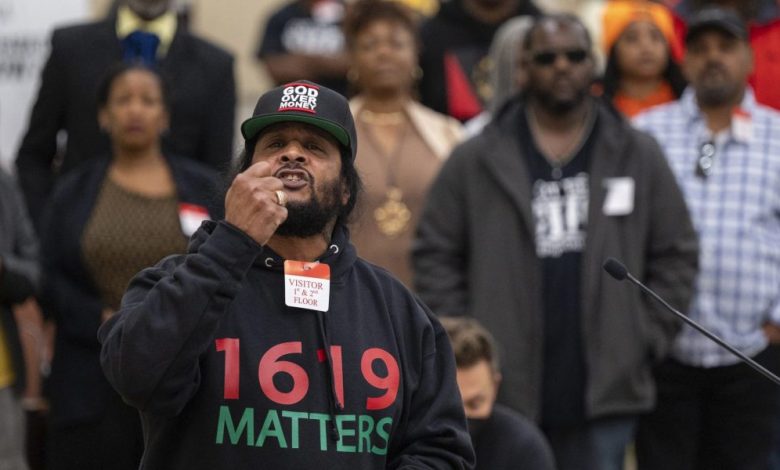The Reparations Task Force has yet to make important decisions about how California should compensate black residents for slavery and discrimination

Nearly two years into the work of the California Reparations Task Force, the group still has important decisions to make that will be the focus of its final report, which recommends how the state will apologize and compensate black residents for the harms caused by slavery and discrimination should.
A vote possibly scheduled for this weekend on requirements for who is entitled to payments and other remedies has been delayed due to the absence of one of the committee’s nine members. But the group can vote Saturday on whether lawmakers should set up an agency to implement an eventual reparations program.
Lawmakers passed legislation in 2020 that created the task force to assess how slavery’s legacy has harmed African Americans through education, criminal justice and other inequalities long after its abolition. The law directs the task force to consider reparations proposals “with special consideration” for the descendants of enslaved blacks residing in California and is not intended to create a program in lieu of a federal government program.
The task force’s work has attracted widespread attention as it is the first of its kind in the country. But some used the group’s recent two-day meeting in Sacramento to warn that not enough black Californians are adequately informed about their work.
One resident said the task force’s groundbreaking 500-page interim report, released last year, should be made available in libraries and schools. But others said it wasn’t just up to the task force and its communications team to publicize their work.
“This space should be filled with the media, and not because black people are pariahs,” Los Angeles attorney Cheryce Cryer said Saturday. “We are at the foot of the totem pole.”
The two-day meeting in Sacramento, the state capital, comes as the group nears its July 1 deadline to release a report for lawmakers. The document will mark a milestone in a growing pursuit of reparations efforts in different parts of the country. It’s a movement supported by a large segment of African Americans, but also by Japanese Americans, who fought to allow families to receive payments from the federal government after residents were sent to internment camps during World War II.
Sacramento resident Tariq Alami, who has followed the task force’s work since its inception, said it was clear the government should have enacted reparations for black Americans long ago.
“It doesn’t take a genius to see that there are differences in society as a result of what we’ve experienced as Black people,” Alami said.
Dozens of attorneys and residents descended on the California Environmental Protection Agency building from across the state to make public comments Friday and Saturday, ranging from detailing family history to confiscation of property from ancestors to calling on federal lawmakers to give the example to follow California.
After the task force released its final report, the fate of its recommendations would rest with the state legislatures, two of whom are members of the task force — Rep. Reggie Jones-Sawyer and state senator Steven Bradford, both Democrats, on the parts represented by Los Angeles district. Lawmakers would also decide where funding for a reparations bill might come from.
The task force has spent several meetings discussing what time frames remediations might depend on for five harm economists for whom estimates are being conducted to quantify the extent of discriminatory policies against black Californians.
Those economists said Friday some of the data and information they still need to produce additional estimates are figures on the gap between what the government paid black residents for confiscated property and the actual value of that property.
The task force previously proposed the following timeframes for the five damages, beginning either with the establishment of the state or with the implementation of certain discriminatory measures: 1933 to 1977 for discrimination and homelessness in housing, 1970 to 2020 for over-policing and mass incarceration, 1850 to 2020 for wrongful possession, 1900 to 2020 for harm to health, and 1850 to 2020 for devaluation of black-owned businesses.
Task Force member Monica Montgomery Steppe expressed concern Friday about making 1977 the landmark year for housing discrimination and homelessness, since black residents make up about a third of Californians affected by homelessness. This year was proposed on the basis of passage of the Community Reinvestment Act, a federal law that encourages lending in low- and middle-income neighborhoods.
The economists said using that year helps support their estimates for the impact of government-sponsored redlining, when black-majority neighborhoods were often classified as “dangerous.”
“There are other reasons why people sleep on the street,” said Steppe.
The task force voted last year to limit reparations to descendants of enslaved or free black people who have lived in the United States since the 19th century. Members have not yet voted on whether to further limit compensation to California residents or to include people who lived in the state and wanted to stay but were displaced.
Elsewhere in the country, reparations proposals for African Americans have had mixed results. A bill that would allow the federal government to study reparations hasn’t come close to a vote in Congress since it was introduced in 1989.
Evanston, Illinois, a Chicago suburb, made national headlines in 2021 as the first city to offer black residents redress in the form of housing benefits. But few have benefited from the program, The Washington Post reported.
In December, San Francisco’s African American Reparations Advisory Committee released a draft report proposing a $5 million payment for each eligible person. The city board of directors is expected to vote on the committee’s final recommendations.
In New York, the state legislature earlier this year reinstated a bill that would create a commission to investigate reparations for African Americans.
Learn how to navigate and build trust in your organization with The Trust Factor, a weekly newsletter exploring what leaders need to succeed. Login here.



